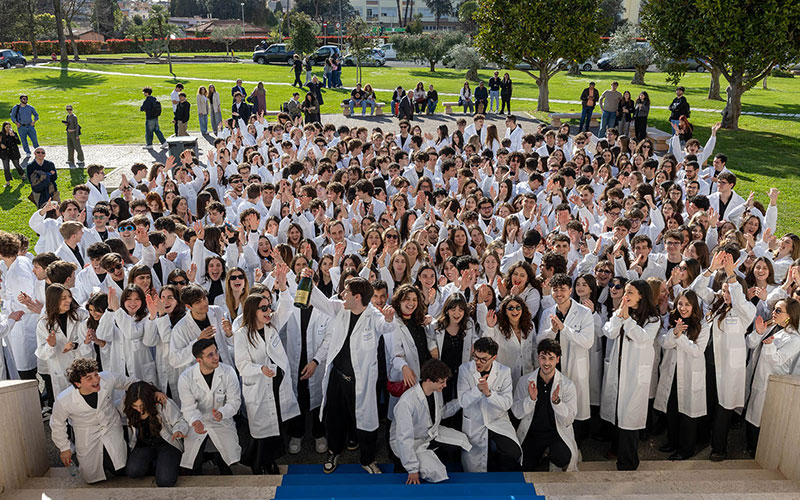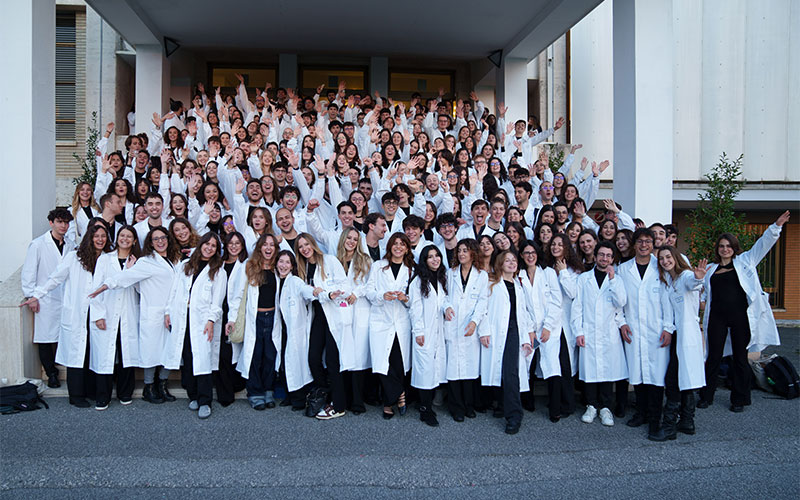“Never be afraid to make mistakes, because some of the most brilliant scientific discoveries are born out of profound early failures” - this is how Professor Ignazio Marino, Executive Vice President for Jefferson International Innovative Strategic Ventures at Thomas Jefferson University, encouraged the students of the six-year integrated programme in Medicine and Surgery at the Faculty of Medicine and Surgery of Università Cattolica, in one of the most significant passages of his keynote address at the White Coat ceremony held on the University's Rome campus on 12 October.
After the participation of two students enrolled in the Triple Degree programme of the integrated six-year degree programme in Medicine and Surgery at the solemn White Coat ceremony at Thomas Jefferson University last July, the Rome campus of Università Cattolica once again experienced the emotion and significance of the event that in Italy marks the entrance of doctors into the wards of hospitals, after attending the first three years of study.
The ceremony was opened by the institutional greeting of Professor Alessandro Sgambato, Vice Dean of the Faculty: “At the Faculty of Medicine and Surgery of Università Cattolica we try every day to transmit to students scientific and clinical tools to become good doctors, ensuring the best teaching and innovative medical practice also thanks to the activities carried out at Policlinico Gemelli. Every day we also engage in research to introduce the most innovative procedures and drugs into clinical practice. Above all, we provide a service to our community.”
“However, we want our students,” continued Sgambato, “to learn not only to be excellent doctors, but also to be good people, professionals and health experts who put the needs of patients, their families, and caregivers first, because treating a patient, acting as a doctor, first and foremost also means taking care of the person. Today these students,” concluded the Vice Dean, “are starting on a beautiful, but difficult and demanding path that will lead them to become excellent doctors. But it will not be easy, and the support of family and friends, as well as teachers and tutors, will be crucial: we all assure you that this support will be there.”
There were many suggestions during the keynote address: the difference between being a doctor and working as a doctor, the challenges raised by technological innovation, such as artificial intelligence, especially with regard to the need to maintain human and empathic contact with the patient, the importance of courage, and the value of error even in the exercise of the medical profession: “Be persevering," continued Professor Marino, "but above all, take care of your relationship with the patient from the very beginning: only this will allow you to 'be a doctor' rather than simply 'working as a doctor'. For certainly, an era such as the one in which you are about to operate, full of continuous technological revolutions, constitutes at the same time an invaluable tool, but also a dangerous threat to the preservation of an empathic approach.”
“I cannot think of a more symbolic moment in the process of becoming a physician than the first time one wears the white coat” – said Professor Giovanni Gambassi, President of the degree programme in Medicine and Surgery in his message to the students. “This is not a mere technical apparel, a safety gear but rather an identity icon that translates almost instantaneously into a status symbol. This has reflections on the outside world but what is invaluable is the magmatic influence that ignites the process of becoming and perceiving themselves as a physician.”
“We really would like Università Cattolica students at the time when they enter Gemelli Hospital for their clinical training years to receive their own official white coat so to begin this maturation phase. This precious time needs to be heavily loaded with medical competence” – Gambassi continued – “but even more so, it has to contribute to shape their identity as women and men serving as health care professionals within a shared system of social, ethical and moral values, which cannot be disregarded or traded for, and which have remained unchanged in the history of humanity.”
“I swear to fulfil, to the best of my ability and judgment, this covenant: I will respect the hard-won scientific gains of those physicians in whose steps I walk, and gladly share such knowledge as is mine with those who are to follow”: at the end of the ceremony it was Dr Francesco Iadevaia, who graduated in Medicine and Surgery in Class 2012, who solemnly proclaimed the Hippocratic Oath, the first deontological text in the history of Medicine, tracing the principles and steps of the new educational and clinical path of each future young physician.
“May I always act to preserve the finest traditions of my calling – echoed by the chorus of the students – and may I long experience the joy of healing those who seek my help”.






